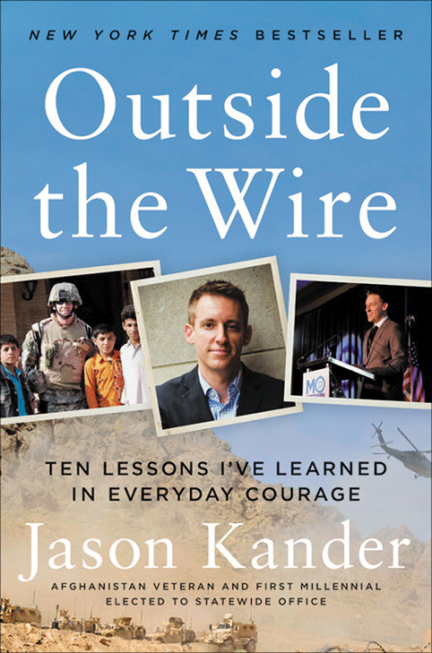 “Outside the Wire: Ten Lessons I’ve Learned in Everyday Courage” by Jason Kander, Twelve Books, $28, 224 pages, August 2018.
“Outside the Wire: Ten Lessons I’ve Learned in Everyday Courage” by Jason Kander, Twelve Books, $28, 224 pages, August 2018.
When Jason Kander was about to deploy to Afghanistan as part of his Army service, an instructor in intelligence school shared this bit of intelligence with him:
“… one Jewish soldier to another — [he] told me not to tell any of my translators that I was Jewish, because they wouldn’t want to work with me if they found out. I didn’t know any better, so I took his advice.”
But Kander’s big secret wasn’t much of a secret after all. It turns out that like Kander, his translator, Salam, had family in Kansas City. They spent a lot of time together, and Kander asked him questions about Islam, but the issue of Kander’s religion never came up.
A few days before he returned home, Kander broke the big news: He told Salam that he was Jewish.
“We were at his safe house snacking on leftovers, and I made sort of a big production of it,” he writes in “Outside the Wire,” a combination of memories, advice and advertisements for democracy.
“Salam looked at me funny and asked, ‘Jason, did you think I didn’t know that?’
“ ‘Well, yeah,’ I said. ‘I mean, I never told you.’
“ ‘Jason, back home in Kansas City, my sister cuts your grandmother’s hair.’ ”
So just as Jewish geography can cross religious and international boundaries, Kander, former Missouri secretary of state and losing candidate for the U.S. Senate in 2016, moves swiftly and surely in this enlightening book, expanding on lessons in everyday courage.
In militaryspeak, being outside the wire means leaving a place of safety for one of greater risk. Kander’s political career was hardly risk-free. He knocked on thousands of doors to win his first campaign, for the Missouri House. Then, at age 31, he became the first millennial in the country to win a statewide office — secretary of state in 2012.
Four years later, he failed in his attempt to oust Sen. Roy Blunt, R-Mo., but Kander still polled far ahead of other Democrats in the Republican statewide rout. Since then, he has become known nationwide for his podcast and his service as head of the group Let America Vote. He announced he was running for mayor of Kansas City, Missouri, in July of this year, but dropped out this week due to PTSD symptoms.
The lessons he has learned along the way are solid, common sense ones, such as:
— “Experience is good, but perspective is golden.”
— “Hustle and be humble.”
— “Politics can be completely absurd. Deal with it.”
— And, “You live your life with your friends [and family], not your accomplishments.”
Kander expands on those and other tenets with a mix of humor, humility, sarcasm, the love of his family and his devotion to Taco Bell Santa Fe Beef Gorditas.
Moved to enlist in the military after 9/11, he left a well-paying job as a lawyer to end up in Afghanistan, “doing a passable job of pretending I was not the most afraid I’d ever been in my life.”
But the wars he was involved in, both real and political, give Kander’s advice a strong sense of authenticity. As a former political science major, he stresses that there isn’t a whole lot of science in real-world campaigns.
“It’s a feel thing,” he writes. “There’s no rule book for what works, which is why this is a book of lessons instead of rules.”
When he talks about being the third Jew ever to hold statewide office in Missouri, Kander recalls going to a rural county during his campaign for secretary of state and hearing that his religion might not play well in the heavily Christian area. He understood that there was “a good chance I was the first Jew a lot of these people would ever knowingly meet,” and he kidded his staff that he was going to start his speech with what he says became the campaign’s unofficial motto:
“Shalom, y’all!”
Don’t look for a straightforward narrative in “Outside the Wire.” Kander explains that he is telling a story unstuck in time, like in “Slaughterhouse-Five,” then quickly proves that assertion, moving back and forth from Kansas City to Kandahar, from his childhood idolatry of baseball’s George Brett to his military training to his time in the Missouri Legislature, all in the space of a few pages.
Such a dizzying narrative can be disconcerting at times, but Kander’s main point comes through on every page: Democracy requires constant attention, devotion and activism.
He assumes that “you picked up this book because you have at least a passing interest in changing the world. Whether it’s running for office, working on a campaign, or leaving your fancy job to join a nonprofit, there’s something you’ve always hoped you might do someday. I hope after reading this book you decide to make that someday today, because the world needs you.”


